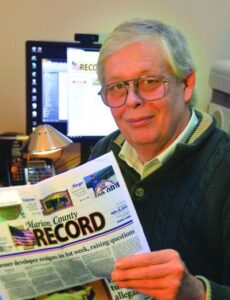The raid of a newspaper office and the home of its owner and publisher in small town Kansas this past summer sparked nationwide outrage over its apparent violation of First Amendment protections for the freedom of the press.
The Marion Police Department confiscated computers and cellphones from The Marion County Record office and the home of its owner and publisher, Joan Meyer, who passed away the day after the raid. State authorities confirmed to The Associated Press in August that the newspaper was alleged to have illegally obtained personal information about a local business owner.
The raids are now thought to have been prompted by a complaint by local restaurant owner, Kari Newell, who accused the newspaper of illegally obtaining her driving record, which includes a 2008 drunk driving conviction.
But co-owner of the paper, Eric Meyer, attributed the raid not only to the paper’s acquisition of this information, but to its coverage of local politics and the town’s then newly hired police chief, Gideon Cody, who resigned in October over backlash to the raids.
Since August, two reporters have filed lawsuits against state officials, claiming their constitutional rights were violated.
In an interview with First Amendment Watch, owner and publisher Meyer discussed the lack of information he’s received regarding the investigation into the raids, his plans to file a lawsuit on behalf of the newspaper in the coming weeks, and what he told the police officers that were searching his newsroom.
Editor’s note: This interview has been edited and condensed for length and clarity.
FAW: What did it feel like in the office during the police raid? Did you object at that specific moment?
EM: I actually wasn’t in the office. I was at my mother’s home. And then I went down to the office. I objected in both places. Before I had objected at her home, they warned the police chief that I was coming to the office. He gave instructions to his other officers that if I impeded in their investigation in any way, he would put cuffs on me. So I very politely, but firmly, said that I believe you’re violating shield law, the First Amendment Privacy Protection Act, and I would like to contact my attorney and his number is in the office and I would like to go in and get his phone number, and they would not allow me to do that. So that’s all on body cam [footage]. I stood by and waited, and there was a brand new officer who was participating in the raid and I said “You know you’ve probably just lost your job out of this.” I told him “This is also on body cam, this is going to be all over the news. This is going to be in the New York Times.” They laughed at that, they didn’t think it would happen. I said “You’re making a serious mistake and you’re going to lose a big lawsuit over this.” They laughed about that too. So they didn’t take it seriously.
FAW: How do you typically balance personal privacy with the public’s right to know, especially in a small town where everybody knows everybody? What was your calculation here?
EM: Realistically, they’re unique in every case, because there’s a degree of public interest and there’s a degree of personal privacy. In this particular case, we obtained this information. We attempted to verify that it was true. It’s pretty easy to create a fake document these days and make it look like something, and there were reasons to believe that this might have been a fake document. The source that gave it to us said she found it on a website. So we went to the website, and we couldn’t find it. In fact, this is what makes the whole identity theft so ironic. We called the people who run the website and asked “How do you get this document?” and they told us. So the document we obtained was obtained with the instructions of the Kansas Department of Revenue, which includes the motor vehicle department. So we sent a note to the sheriff and the police chief, saying we had this information on an individual. We did not even say who it was. Only that we obtained from a source and we verified that it’s true. Never heard a response back. Their response to that was them raiding our office.
FAW: Videos of the raid went viral. Why did you decide to release security footage of the incident?
EM: We have operated from day one that we would answer anybody’s question as soon as they ask it. We didn’t prioritize anybody or favor anybody. Whoever got through to us, that’s who we talked to. And we didn’t initially remember that we had the security footage and we couldn’t access it for a while because our network was down. Once we got our network up, we started looking at it, and whoever the next person was who happened to interview me about something at the time, and I may have mentioned in there and we just started releasing it.
FAW: Where does the paper stand now? Did the raid aid in expanding your coverage in any way? Have you suffered financial losses or inadvertent financial gains because of it?
EM: I could say yes to all of those things, in different situations. The outpouring of support that we got from people was wonderful. [But] it’s cut both ways and it really has overwhelmed our staff. We’re pretty damn short-staffed and we aren’t able to do many of the things we want to do. We’re pulling right up to the deadline every week. We’re working massive numbers of hours. Nobody gets time off and you’re in an environment where you’re dealing with people who tried to do illegal things to you, and they’re still in office. It’s not an ideal work situation. I have told several people, many times, that people think it was heroic that we still put out a paper the next week. That was just automatic.
FAW: Have you received any indication that the investigation by the Kansas Bureau of Investigation, which has recently requested assistance from Colorado’s Bureau of Investigation into the civil rights violation claims, is almost complete? What type of correspondence have you received, if any?
EM: I have received as much information from the Kansas Bureau of Investigation as I have direct commandments from God. Nothing … One thing that I don’t think either the Colorado or Kansas Bureau of Investigation understands is, when they talk to somebody, we know about it. I mean, they call us and tell us that they’ve been interviewed. So we know when they’ve done all their interviews. We know all the people they have interviewed. They haven’t interviewed anybody in weeks. We don’t know what they’re doing.
FAW: Are you planning to file a lawsuit on behalf of the newspaper itself?
EM: We have been waiting to file our version until after the report. There’s some hoops that have to be jumped through because the next lawsuit will be by Hoch Publishing company, which is the newspaper. I’m the president of that, and actually, I own almost all the stock of it … but there’s a lot of little paperwork that needs to be taken care of before the suit can be filed. Plus, of course, we’re trying to do our due diligence and actually investigate the situation to the best of our ability before we say things, and it has been very active. It’s very clear that this was done as an act to intimidate political opponents, and personal opponents, and it relied upon the ignorance, or acquiescence, the willingness to accept that the bully is ruling the roost. So there were a lot of motives that affected a lot of people. We never were going to bend to their wishes, and it just kept accelerating. And so I think this stuff happens everywhere. Not raids necessarily. They stop short of that. They get what they want before they go to raid. They silence people before they get to that level. The fact that they couldn’t intimidate us with all the other techniques that they were doing, they just kept ratcheting it up and ratcheting it up and ratcheting it up, until they finally did something that was so universally received as wrong, that other people started noticing. But I am absolutely certain this is happening probably at every little community around the country and every large community, too. Everyone wants to control the message and they don’t like it that anybody else does. And they will fight it and this time the water turned hot enough for somebody else to notice.
More on First Amendment Watch:





